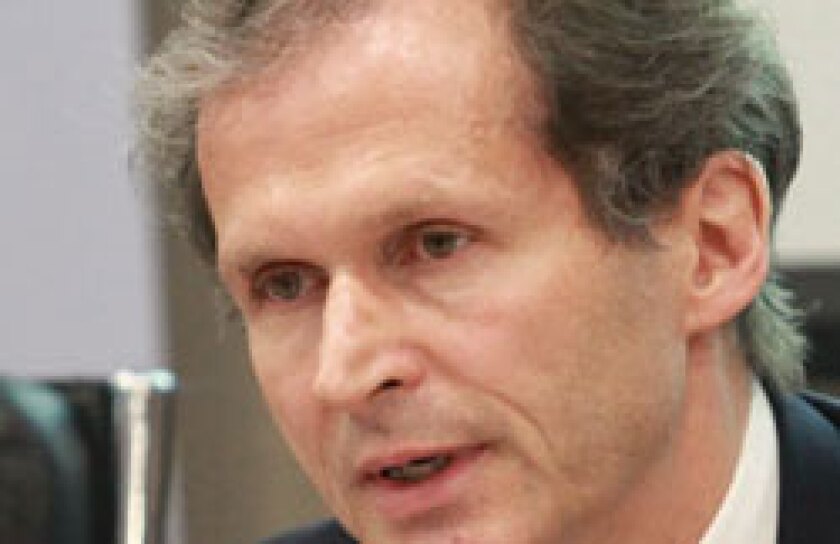The Maastricht criteria that countries need to fulfill in order to adopt the euro are too tight for countries in Central and Eastern Europe, who should relax their budget deficit targets in order to be able to fight the economic downturn, Erik Berglof, chief economist at the European Bank for Reconstruction and Development (EBRD) said in an interview.
The criteria requires countries to have budget deficits no higher than 3% of gross domestic product, their debt must not exceed 60% of GDP while inflation must be no more than 1.5 percentage points above the average of the three best performing European Union member states.
"They [the Maastricht criteria] had other countries in mind when they were formulated in the first place, they were never really perfect for our countries," Berglof said.
"It's more a matter of the deficit criteria that is binding, and that's where they have problems meeting the criteria. I think they should be relaxed for now. There are very few eurozone members that meet these targets right now."
There is “not a lot of fiscal space” in any of the countries under the EBRD’s remit, and those who do have it would better use it to help the recovery, he added.
Traditionally, most countries in Central and Eastern Europe have maintained their debt level under the 60% of GDP recommended, but budget deficits have been higher than 3% because of investment in infrastructure needed to catch up with richer EU peers but also, critics say, because of weak fiscal discipline in some of the countries. “In a way these countries are becoming more like the [euro] joiners in the earlier phases, because debt is being accumulated, because the obligations of the governments are becoming larger,” Berglof said. “It's important to have targets in these areas, it's just sticking to the specific targets right now is probably not the right thing.”
One by one, many countries in CEE dropped their estimated dates for adopting the euro, as the crisis crippled their ability to meet the criteria but also as the eurozone has fallen deeper and deeper into trouble since the Greek debt crisis flared up two and a half years ago.
‘UNDERSTANDABLE’
While some countries, which have currency boards, are still committed to joining, others that have floating currencies – such as the Czech Republic, Poland, Hungary and Romania – have more or less quietly given up on their original joining dates.
"I think it's very understandable that they are doing this at the moment. The way the targets were set up, they were not meant to deal with this kind of deep crisis situation that we are slowly coming out of. I can understand that countries do this," said Berglof.
But, he added, the worry is that nothing will replace the countries’ targets to join the single currency and there will be no pressure on the policymaking process; therefore countries in CEE should replace their targets of joining the euro with targets on when the process will be back on track.
“I think it's more about trying to adjust and send signals where you're going, in terms of debt level, in terms of fiscal targets,” Berglof said. “It's important to have targets in these areas, it's just sticking to the specific targets right now is probably not the right thing.”
The debt crisis in the eurozone and policymakers’ lack of ability to solve it have eroded the single currency’s credibility, contributing to its lack of attractiveness for new members.
“You have a eurozone that you don't really know what it's going to look like. We're getting better sense, gradually, but take this spring, there was almost no certainty what the eurozone would look like and there was even the concern that it might not survive. That is not a very attractive anchor to have for your economic development,” said Berglof. "Both the eurozone and the European Union have clearly been damaged by the crisis and by the way that policymaking has responded to the crisis."
BANKING UNION
Crucial to repairing the eurozone’s damaged credibility is the banking union, if it is done right and if the reforms include “some elements of the fiscal union,” according to Berglof.
The EBRD, in its annual transition report, said the banking union as it was proposed by the European Commission was incomplete as it should include countries in emerging Europe whose banking systems are dominated by Western European banks.
Shifting banking supervision and resolution from a national to a supernational, EU level would be a step that would give back authority to the EU, but it must be something which is in agreement with citizens of European countries, not just their leaders, Berglof said.
"But I happen to think that actually banking union is something where you can get some real traction for EU support,” he said.
“I think people are fed up with these banks with very close relationships with policymakers, getting all kinds of privileges, not addressing their remuneration issues and so on... you can bang the drum pretty hard and get people to understand that to address this you have to go above the national level and look at what you can do at an European level.”
“For the first time in quite some time there is an issue that you really can use to get people excited."
